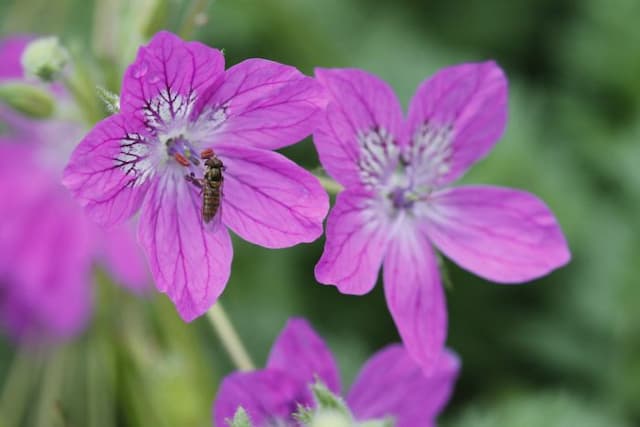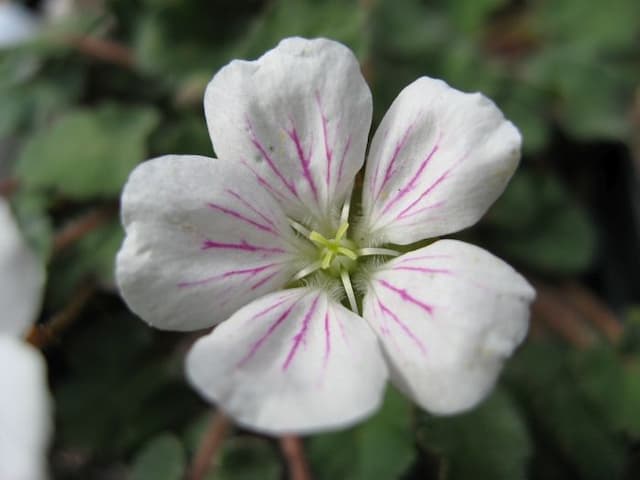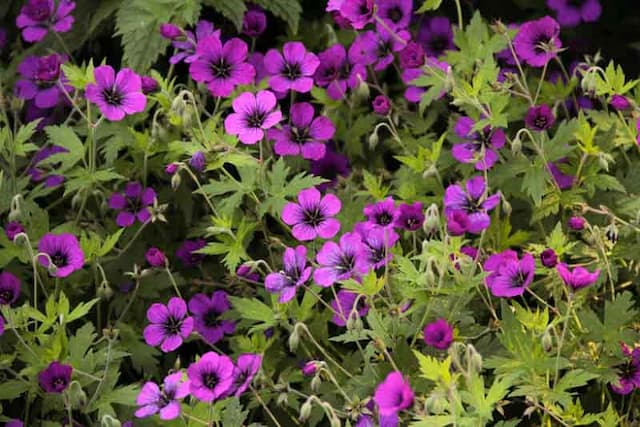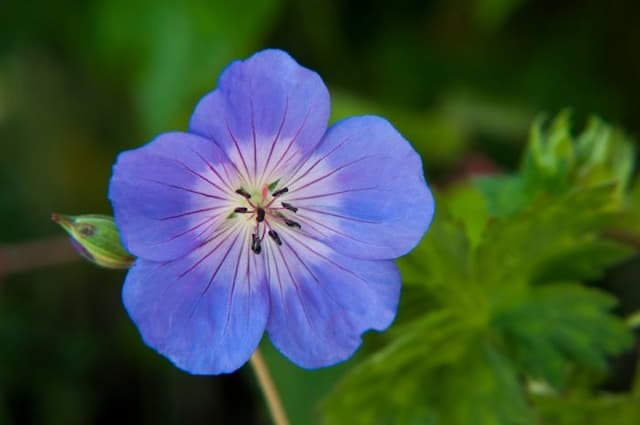Geranium Pelargonium 'Claire' (Z)

ABOUT
Pelargonium 'Claire' is a plant cherished for its showy and attractive blooms, which make it a popular choice for gardeners. This variety is known for its bright and colorful flowers that come in a range of hues, often in vibrant shades of pink, red, or purple. The petals may exhibit unique patterns, such as veins or darker colored markings that can add depth and contrast to the flowers. The plant has a lush foliage that provides a complementary backdrop to its striking flowers. The leaves are typically rounded, slightly heart-shaped or zonal, and have a soft, velvety texture. They are often aromatic when touched or gently bruised, giving off a pleasant scent that adds to the sensory experience of the garden. The fragrance can vary, with some having a lemony or rose-like aroma. A resilient and versatile plant, Pelargonium 'Claire' enjoys growing in containers as well as in garden beds, making it suitable for a variety of settings. It can be used as an ornamental plant both indoors and outdoors, to add color and vibrancy to patios, balconies, and indoor spaces. In flowerbeds, it often serves as a focal point because of its abundant and eye-catching blooms. Some varieties may have a trailing or upright habit, which influences how they can be used in landscaping. The trailing types are excellent for hanging baskets or cascading over the edges of pots, while the upright varieties are more suited for creating structure and height in flower displays. The branches are somewhat woody at the base, with soft green growth where the abundant blooms emerge. Overall, Pelargonium 'Claire' is a charming and delightful plant that brings a burst of color to any setting with its gorgeous flowers and aromatic foliage. Its ease of care and adaptability also contribute to its popularity among garden enthusiasts.
About this plant
 Names
NamesSynonyms
Zonal Geranium, Claire Geranium.
Common names
Pelargonium 'Claire' (Z).
 Toxicity
ToxicityTo humans
Geraniums, including Pelargonium 'Claire', are not considered highly toxic to humans. However, ingestion of large quantities of plant parts could potentially lead to mild gastrointestinal upset, such as vomiting or diarrhea. There could also be a risk of skin irritation or dermatitis from handling the plants due to the presence of essential oils.
To pets
Geraniums, specifically Pelargonium 'Claire', can be toxic to pets, including dogs and cats. If ingested, the plant can cause mild to moderate gastrointestinal upset, which might present as vomiting, anorexia, depression, or diarrhea in pets. Cats may be more sensitive and also experience lethargy and dermatitis. It is advisable to keep this plant out of reach of pets to prevent potential poisoning.
 Characteristics
CharacteristicsLife cycle
Perennials
Foliage type
Evergreen
Color of leaves
Green
Flower color
Mixed
Height
1-2 feet (30-60 cm)
Spread
1-2 feet (30-60 cm)
Plant type
Herb
Hardiness zones
10
Native area
South Africa
Benefits
 General Benefits
General Benefits- Aromatic Foliage: Pelargonium 'Claire' is known for its fragrant leaves, which can provide a pleasant scent to the garden or home when brushed against or crushed.
- Attractive Blooms: The plant produces beautiful flowers that can add a pop of color to garden beds, containers, or as part of a bouquet.
- Drought Tolerance: Once established, they are relatively drought-tolerant, making them suitable for gardens in drier climates or for gardeners with limited watering capabilities.
- Low Maintenance: Geraniums are generally easy to care for, requiring minimal maintenance, which can be beneficial for those with busy lifestyles or less gardening experience.
- Pest Resistance: These plants are resistant to many common garden pests, which helps reduce the need for chemical insecticides in the garden.
- Versatility: Geraniums can be grown in a variety of settings, from garden beds and borders to hanging baskets and indoor pots.
- Long Blooming Season: They have a long flowering period from spring to fall, providing extended visual interest in the garden.
- Easy Propagation: Pelargoniums can be easily propagated from cuttings, making it simple to create more plants for expanding the garden or sharing with friends.
 Medical Properties
Medical PropertiesThis plant is not used for medical purposes.
 Air-purifying Qualities
Air-purifying QualitiesThis plant is not specifically known for air purifying qualities.
 Other Uses
Other Uses- Potpourri Ingredient: The scented leaves of the geranium can be dried and added to potpourri mixtures to impart a pleasant fragrance to your home.
- Flavoring Agent: Geranium leaves can be used to flavor jellies, teas, and desserts, often contributing a subtle rose-like essence.
- Natural Dye: The vibrant flowers of the geranium can be used to produce a natural dye for fabrics, yarn, or even paper crafts.
- Mood Enhancer: The pleasant scent of geranium is often used in aromatherapy to help reduce stress and improve mood.
- Insect Repellent: The strong scent of geranium can deter various insects; placing potted plants near windows or doors may help to keep bugs at bay.
- Garden Borders: Geraniums can be planted in garden borders to create attractive outlines and provide a splash of color among other greenery.
- Companion Planting: Geraniums may help protect nearby plants by keeping certain pests away, benefiting vegetable gardens or mixed plantings.
- Art and Craft Project: Geranium petals and leaves can be used in collages and other art projects for their color and texture.
- Floral Arrangements: Fresh or dried geranium flowers can be used in bouquets and floral arrangements to add color and fragrance.
- Greener Compost: The green matter of geranium plants can be added to compost piles to help balance the carbon-nitrogen ratio and enrich the resulting compost.
Interesting Facts
 Feng Shui
Feng ShuiThe Geranium is not used in Feng Shui practice.
 Zodiac Sign Compitability
Zodiac Sign CompitabilityThe Geranium is not used in astrology practice.
 Plant Symbolism
Plant Symbolism- Comfort: Geraniums in general symbolize comfort and familiarity because they are popular and commonly found in home gardens and on windowsills.
- True Friendship: The 'Claire' variety, like other geraniums, might represent true friendship as they are resilient and reliable, much like the quality of a steadfast friend.
- Healing: Geraniums are sometimes associated with healing properties, both physically, in herbal contexts, and emotionally, with their bright flowers bringing cheer.
- Positivity: With its bright flowers, the geranium can represent positivity or bringing positive energy to a situation.
- Femininity: The soft, rounded shape of the flowers and the nurturing aspect of caring for plants often align with traditional symbols of femininity.
 Water
WaterGeraniums, such as Pelargonium 'Claire,' prefer their soil to be kept evenly moist but not soggy. During the growing season, water the geranium when the top inch of soil feels dry, which typically means once every 1 to 2 weeks, using around 16 ounces of water each time, though this may vary based on factors like temperature and humidity. In winter, reduce watering to every 2 to 3 weeks as the plant goes through a rest period and requires less moisture. Take care not to wet the foliage as this can lead to fungal diseases.
 Light
LightGeraniums thrive in bright, indirect sunlight. Pelargonium 'Claire' should be placed in a location where it receives at least 4 to 6 hours of sunlight daily. A spot near a south-facing or west-facing window would be ideal, provided the intense midday sun is diffused to prevent leaf scorch; sheer curtains can help with this.
 Temperature
TemperatureGeraniums are quite temperature tolerant, but Pelargonium 'Claire' performs best in a range between 65 and 75 degrees Fahrenheit. They can survive minimum temperatures of 55 degrees Fahrenheit and shouldn't be subjected to temperatures below 50 degrees Fahrenheit to avoid cold damage. Keep the geranium away from drafts and sudden temperature changes.
 Pruning
PruningPruning is essential for keeping Pelargonium 'Claire' healthy and promoting bushy growth. Prune the geranium back in spring and after flowering to encourage new growth and remove dead or faded blooms and leaves. The best time to prune is when you see new growth starting; usually, this is in the early spring. It's often recommended to remove up to one-third of the plant to keep it compact and vibrant.
 Cleaning
CleaningAs needed
 Soil
SoilThe best soil mix for a Pelargonium, commonly known as a geranium, is well-draining potting soil with added perlite or coarse sand. The ideal soil pH for geraniums is between 6.0 and 7.0.
 Repotting
RepottingGeraniums should be repotted every 1 to 2 years or when they become root-bound to encourage growth and prevent nutrient depletion.
 Humidity & Misting
Humidity & MistingGeraniums prefer moderate to slightly dry humidity levels, performing best in normal household humidity or lower; they do not require high humidity.
 Suitable locations
Suitable locationsIndoor
Place in bright light, allow soil to dry between waterings.
Outdoor
Full sun to part shade, protect from frost, water moderately.
Hardiness zone
10-11 USDA
 Life cycle
Life cycleThe life cycle of the Pelargonium 'Claire' (more commonly known as geranium 'Claire') begins with germination, where seeds sprout in warm, moist soil, usually in spring or when temperatures are favorable. Following germination, the seedling develops true leaves and a root system; this juvenile phase quickly transitions as the plant grows. During the vegetative stage, the geranium 'Claire' develops a bushy structure with lobed leaves, and as it matures, it starts to produce clusters of colorful flowers beloved by gardeners, which can occur repeatedly in favorable conditions. After pollination, which can involve insects or be wind-assisted, the plant produces fruit containing seeds, completing the reproductive phase. During the senescence stage, the plant's growth rate slows down, and it may die back, especially if exposed to frost or cold conditions, though it can be perennial in warmer climates. Throughout its life, the geranium 'Claire' may undergo pruning and division, horticultural practices that prolong its lifespan and encourage further growth and flowering.
 Propogation
PropogationPropogation time
Spring-Early Summer
Propogation: The Pelargonium 'Claire' commonly known as Geranium, is best propagated through stem cuttings. This method is typically performed in late summer to early fall, but it can also be done in spring. To propagate by cuttings, a healthy stem about 4-6 inches long is selected and cut just below a leaf node using a sharp, sterilized blade. The lower leaves are removed, and the cut end can be dipped in rooting hormone to encourage root growth. The cutting is then placed in a pot with well-draining soil, watered lightly, and covered with a plastic bag or placed in a propagator to maintain humidity. Roots usually develop within a few weeks, after which the plastic can be removed, and the new plant can eventually be transplanted into a larger pot or into the garden.









![Cranesbill [Rothbury Gem]](/_next/image?url=https%3A%2F%2Fplants-admin.emdemapps.com%2Fimages%2Fplants%2F%2Fimages%2F604b6243984c2.png&w=640&q=75)